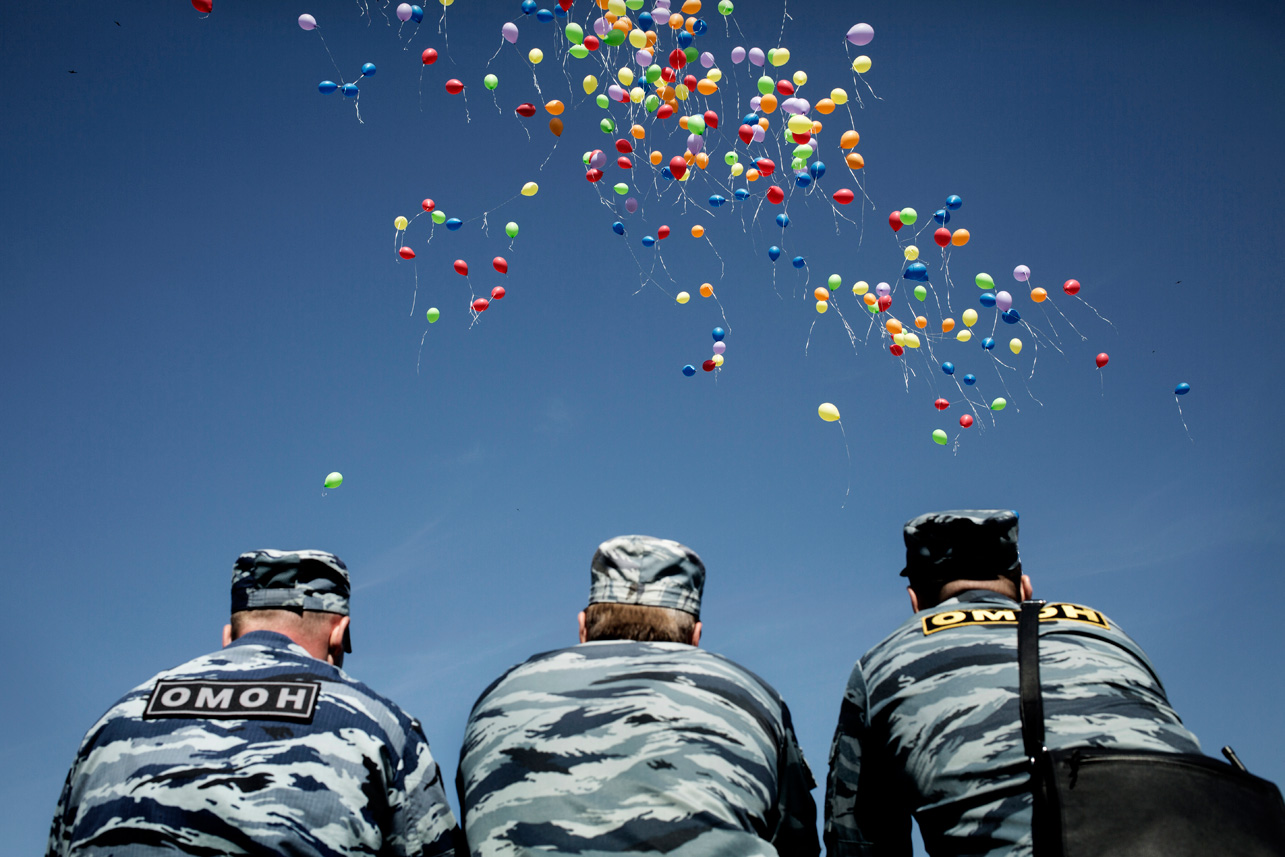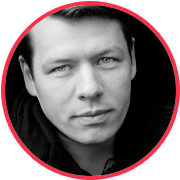
Homophobia in Russia: Photo Project of WPP Winner Mads Nissen
As a rule, WPP winners are dramatic pictures dedicated to big events, and often these shots are rough. A picture of a Danish photojournalist Mads Nissen is not like that.
“We see two moonlit silhouettes, a golden curtain on the background… You want to contemplate this image, keep your eyes on it,” WPP jury member Donald Weber says, adding that it is works like this that can engage a broad audience.
The topic that Nissen is concerned with is the prevalence of homophobia in Russia. The photograph that became World Press Photo of the Year is a beautiful portrait, claiming the right for love, but other photographs from this series are about the violation of rights of homosexuals.
“This story critiques homophobia in Russia. However, it actually also has a more broad theme,” Mad Nissen himself comments. “Homophobia is intrinsic in many societies. Personally I wanted to understand what I think about it, what I think on homosexuals. I have a little son, his name is Thor, like the Scandinavian god of thunder. How would I react if I found out he was gay? So, this story is personal to me. However, it is also about human rights.”

To me it all began on a bright summer day, June 2013, in Saint Petersburg. “Are you a faggot? Are you a fucking faggot?” a young man with a military style haircut and a sporty outfit screams at Pavel. Pavel Lebedev is 23 years old. He is wearing an orange shirt and an insecure smile. I had met him the previous day where he told me how he made the tough decision to come out of the closet. And he told me about the price he had to pay for following his heart. Now, he was being yelled at once again. Pavel calmly answers the question: “Yes, I am homosexual…”
He barely gets to finish the word “homosexual” before the first punch hits him. The young man in the sporty outfit has obviously waited for this situation. Filled with hate, he cannot hold himself back any longer, and tries to give Pavel another punch in his face.
I’m outraged. How can this be happening? Today? Punching, kicking and spitting at a gentle and shy young man like Pavel, simply because he is attracted to men and not women? It’s unbelievable. It’s not fair. And I thought to myself, “Something needs to be done!” But instead of getting involved in the fist fight, I began to photograph. I began to document the many different aspects of homophobia in modern Russia. I’ve seen violent attacks from homophobic groups that kidnap gays and torture them for hours, while filming it all to share it on social media. I photographed lesbian couples that fear their children might one day be forcibly removed from them. I’ve been inside the court where people are accused under the new anti-gay law and much more. But at one point I felt I needed some pictures of what it was essentially all about: Love and the unstoppable desire between two people, regardless of their sexual orientation.
I became a photographer to be able to tell important stories to the rest of the world. This is happening right now. From Russia, to Amsterdam, to Shanghai, to Johannesburg, this image is creating debate about the rights of the LGBTs. That makes me humble and proud.
Homophobia in Russia
Kirill Fedorov, age 21, is bleeding from his face after national-conservative extremists have surrounded, beaten and kicked him and and his friends attending a Gay Pride Rally in St. Petersburg. The group of friends try to stick close together and seek cover behind the police, as stones and eggs that are being thrown at them. The rally was declared illegal under the law banning “gay propaganda” and Kirill Fedorov and the other LGBT-activists were all later arrested and presented to court.
On June 30, 2013, Russian President Vladimir Putin signed into law an ambiguous bill banning the “propaganda of nontraditional sexual relations to minors.” The so-called anti-gay law has been met with widespread condemnation from human rights and LGBT groups.
{“img”: “/wp-content/uploads/2015/05/Russia_LGBT_001.jpg”, “alt”: “Mads Nissen”}
If not arrested by the police, LGBT-activists usually leave rallies together in busses to avoid being followed and attacked. As the bus waits in traffic, national-conservative extremists surround and attack the bus and try to smash the windows with rocks.
{“img”: “/wp-content/uploads/2015/05/Russia_LGBT_002.jpg”, “alt”: “Mads Nissen”}
Jon, 21, and Alex, 25 both live in St. Petersburg and are both activists in the local LGBT community. I was introduced to Jon and Alex on the evening of May 19th. We hung out, had some beers, and eventually I was invited to their bedroom. To me this image is not just about homophobia in Russia. It’s an opportunity for all of us to look at ourselves, and ask if we are tolerant enough.
{“img”: “/wp-content/uploads/2015/05/Russia_LGBT_004.jpg”, “alt”: “Mads Nissen”}
Maxim Martsinkevich whose street name is Tesak (“Hatchet”) (wearing a black T-shirt) is a self-declared militant homophobe and the host of a popular online video-show where gays are tricked into fake dates but instead of a romantic encounter, a band of armed national-conservative extremists are waiting to take them away. The victims are sexually humiliated and tortured, while everything is filmed and posted online. A defining part of each video is when the victims’ heads are partially shaved and the international LGBT-symbol – the rainbow colors — is painted on their heads.
(Editor’s Note: In August 2014 Maxim Martsinkevich was convicted for 2 years and 10 months for posting three videos on Russian social network Vkontakte that the court considered extremist, and is currently serving his sentence.)
{“img”: “/wp-content/uploads/2015/05/Russia_LGBT_005.jpg”, “alt”: “Mads Nissen”}
Still-frames from videos showing the unidentified victims of homophobe Tesak. The logo in the corner bears the title “NETTING THE FAGGOTS!”
{“img”: “/wp-content/uploads/2015/05/Russia_LGBT_006.jpg”, “alt”: “Mads Nissen”}
Vitaly Milonov is a politician and a member of President Putin’s United Russia Party. He is one of the country’s most influential and harsh critics of homosexuality and LGBT-rights. He was the principal sponsor of legislation which criminalized “gay propaganda.” He is devoutly religious and a member of the Russian Orthodox Church where he occasionally volunteers as a sub-deacon at a local church in St. Petersburg.
{“img”: “/wp-content/uploads/2015/05/Russia_LGBT_007.jpg”, “alt”: “Mads Nissen”}
Bullets for a gun in the hand of Filipp Razinskiy, 16, a member of Martsinkevich’s organization “Occupy Pedophilia” that specialised in hunting and filming violent attacks on suspected gays and pedophiles (the group believes that gays and pedophiles are almost equally immoral and that most gays are pedophiles and vice verse).
{“img”: “/wp-content/uploads/2015/05/Russia_LGBT_008.jpg”, “alt”: “Mads Nissen”}
Strong religious and conservative groups within Russia advocate the forced removal of children from LGBT-families. With the increase in violent physical, verbal and legal attacks on LGBT-rights the lesbian couple Lada, 33 (left), and Irina, 31, are worried about their own safety and that of their three small children.
{“img”: “/wp-content/uploads/2015/05/Russia_LGBT_009.jpg”, “alt”: “Mads Nissen”}
Jon and Alex.
{“img”: “/wp-content/uploads/2015/05/Russia_LGBT_010.jpg”, “alt”: “Mads Nissen”}
Ekaterina Alekseeva, 21, appears in court after being arrested at a Gay Pride Rally on June 29, 2013. The rally was declared illegal under the law banning “propaganda for non-traditional sexual relations in the underaged” and Ekaterina Alekseeva is now facing the consequences.
{“img”: “/wp-content/uploads/2015/05/Russia_LGBT_011.jpg”, “alt”: “Mads Nissen”}
As in other countries, Russia’s LGBTs tend to move from the countryside into the cities in search of like-minded people. In many cases their families have abandoned them and so the LGBT community turns to each others fellowship. Activists gather and light candles on the International HIV Vaccine Awareness Day, May 18, 2014.
{“img”: “/wp-content/uploads/2015/05/Russia_LGBT_012.jpg”, “alt”: “Mads Nissen”}
The intimate nightclub Central Station is one of the few havens for LGBT people in St. Petersburg. 27-year-old Ruslan, a ballet dancer at The Academy of Russian Ballet, was married to a woman for five years but recently came out after they divorced.
{“img”: “/wp-content/uploads/2015/05/Russia_LGBT_013.jpg”, “alt”: “Mads Nissen”}
From a safe distance, three members of the special OMON police force watch an LGBT rally in St. Petersburg. Despite the law banning “gay-propaganda” this rally was allowed to go ahead because the organizers had agreed not to use certain signs and slogans.
{“img”: “/wp-content/uploads/2015/05/Russia_LGBT_014.jpg”, “alt”: “Mads Nissen”}
Yaroslav Yevtushenko (left) embraces his boyfriend Dmitry Chunosov at St. Petersburg’s registry office where the couple attempts to officially register their marriage as an act of protest. Since same sex marriages are not recognised in Russia their submission was promptly rejected by the authorities.
{“img”: “/wp-content/uploads/2015/05/Russia_LGBT_015.jpg”, “alt”: “Mads Nissen”}
New and best




